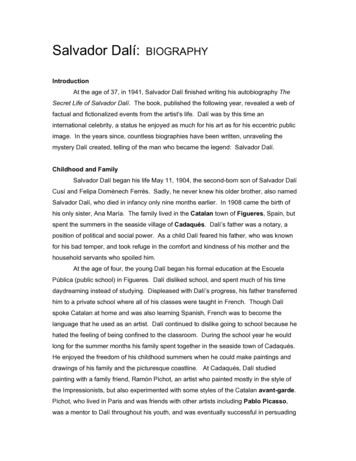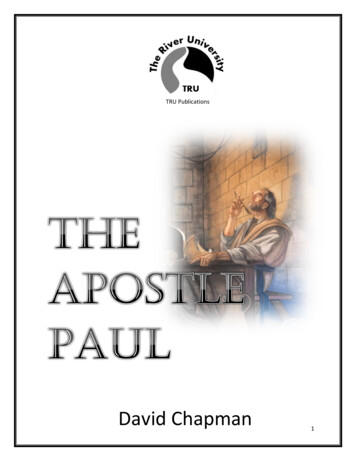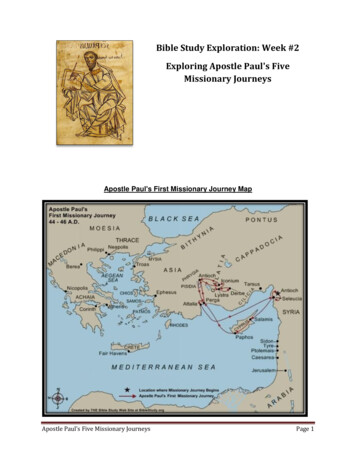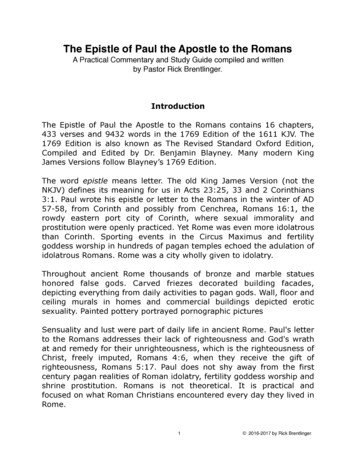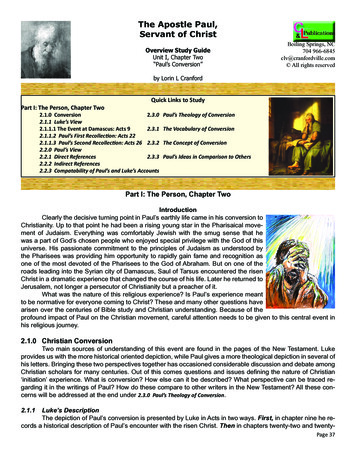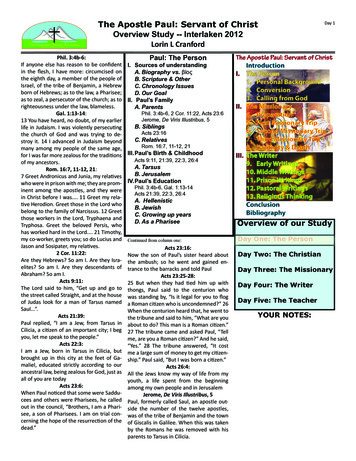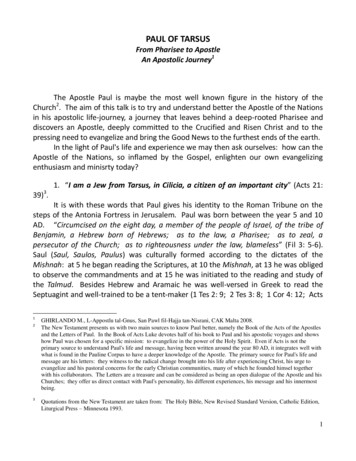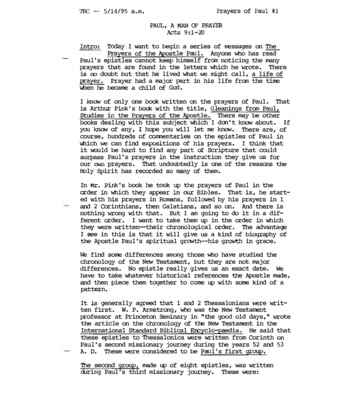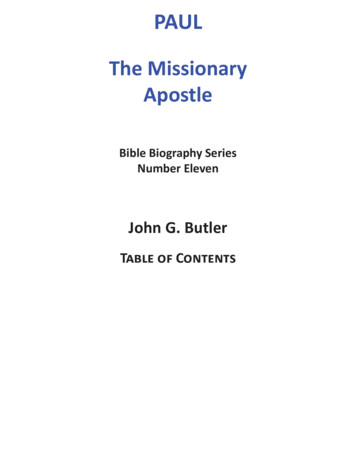
Transcription
PAULThe MissionaryApostleBible Biography SeriesNumber ElevenJohn G. ButlerTable of Contents
ContentsPreface 7I. Persecutor of BelieversVarious texts 7A. THE BACKGROUND OF THE PERSECUTOR 8B. THE BRUTALITY OF THE PERSECUTOR13II. Power of God 28A. THE REVELATION OF CHRISTB. THE RESPONSE OF PAUL 36C. THE ROLE OF ANANIAS 43728III. Preparations for Service 55A. THE SECLUSION IN ARABIAB. THE SOJOURN IN DAMASCUSC. THE SEASON IN JERUSALEMD. THE STAY IN TARSUS70555865IV. Placement in Service 73A. THE SEEKING FOR PAUL IN TARSUSB. THE SERVING OF PAUL IN ANTIOCHC. THE SENDING OF PAUL TO JERUSALEM747880V. Première of Missions85VI. Preaching in Pisidia109A. THE SUMMONS IN ANTIOCHB. THE START IN SALAMIS 90C. THE SORCERER IN PAPHOS 93D. THE SHIRKER IN PERGA 10585A. THE PLACE OF THE PREACHING 110B. THE PARTICULARS OF THE PREACHINGC. THE PEOPLE AND THE PREACHING113126VII. Polarization in Iconium 133A. THE MINISTRY OF GOD’S SERVANTSB. THE MENACING OF GOD’S SERVANTS134140VIII. Problems in Lystra144
A. THE HEALTH PROBLEM145B. THE HONOR PROBLEM 151C. THE HARASSMENT PROBLEM156IX. Proceeding to Completion 160A. THE FURTHERANCE OF THE GOSPEL161B. THE FOLLOW-UP OF THE CONVERTS163C. THE FURLOUGH OF THE MISSIONARIES 168X. Polemics About Legalism 172A. THE CONTENDERS FOR LEGALISM 173B. THE CONFERENCE ABOUT LEGALISM182C. THE COMMUNICATION AGAINST LEGALISMD. THE CENSURE INVOLVING LEGALISM198XI. Parting From BarnabasA. THE CONCERN OF PAUL 204B. THE CONFLICT OVER MARK206C. THE CHANGE IN ASSOCIATES211D. THE COMMENCEMENT OF TRAVELING194203219XII. Plan of God 223A. THE DISCERNING OF GOD’S WILL 223B. THE DOING OF GOD’S WILL230C. THE DIVIDENDS OF GOD’S WILL 236XIII. Prisoners in Philippi 243A. THE DISTURBANCE OF THE MISSIONARIESB. THE DETENTION OF THE MISSIONARIES 249C. THE DELIVERANCE OF THE MISSIONARIES244264XIV. Propagating in Thessalonica 270A. THE MINISTRY OF THE WORD271B. THE MEANNESS OF THE WICKED 283XV. Prudence in BereaA. THE DETAILS OF THEIR PRUDENCEB. THE DISDAIN OF THEIR PRUDENCE288290296XVI. Paganism in Athens 300A. THE STIRRING BECAUSE OF PAGANISM 301B. THE SITUATION AMIDST PAGANISM303
C. THE SERMON AGAINST PAGANISMXVII. Parish of CorinthA. THE SIGNIFICANT CIRCUMSTANCESB. THE STEADFAST COMMUNICATINGC. THE SURPRISING COURT 332D. THE STRANGE CONCLUSION336306317318322XVIII. Proclaiming in Ephesus 343A. THE TRAVELING PRELUDE 345B. THE TEACHING EXPERIENCES347C. THE TRANSCENDENT MIRACLES 356XIX. Pandemonium in Ephesus 362A. THE CONTEMPLATION BEFORE THE PANDEMONIUMB. THE CAUSE OF THE PANDEMONIUM368C. THE CHARACTER OF THE PANDEMONIUM371D. THE CESSATION OF THE PANDEMONIUM 377XX. Pursuing the PlanA. THE STAY IN GREECE381B. THE SERVICE IN TROAS 387C. THE SAILING TO MILETUS 393363381XXI. Pausing to Instruct 395A. THE EXAMPLE IN THE INSTRUCTION396B. THE EXHORTING IN THE INSTRUCTION 403C. THE EXIT AFTER THE INSTRUCTION410XXII. Persisting About Jerusalem 411A. THE PROHIBITING IN TYRE 413B. THE PROTESTING IN CAESAREA 416XXIII. Purification in JerusalemA. THE DAYS BEFORE THE PURIFICATION 423B. THE DESIRE FOR THE PURIFICATION426C. THE DISTURBANCE FROM THE PURIFICATION422433XXIV. Plea Before Troublemakers 441A. THE CREDENTIALS OF PAULB. THE CONVERSION OF PAULC. THE CALLING FOR PAUL 454442445
D. THE CONTEMPT FOR PAUL 457XXV. Provoking the SanhedrinA. THE SMITING OF PAUL 462B. THE SCHISM OVER PAUL 468C. THE SOLACE FOR PAUL 472460XXVI. Protection From ConspiracyA. THE NEED OF THE PROTECTION 477B. THE NEPHEW IN THE PROTECTIONC. THE NATURE OF THE PROTECTION483489XXVII. Performance Before Felix 495A. THE PUBLIC TRIAL 495B. THE PRIVATE HEARINGS 508XXVIII. Protesting Before Festus513XXIX. Profession Before Agrippa524A. THE PROMPTING OF THE TRIAL 514B. THE PARTICULARS OF THE TRIAL 518A. THE OCCASION FOR THE HEARINGB. THE OCCURRENCE OF THE HEARINGC. THE OUTCOME OF THE HEARING 543525531XXX. Peril at Sea 547A. THE PROGRESS BEFORE THE STORM548B. THE PREDICTION ABOUT THE STORM552C. THE PARTICULARS OF THE STORM 558D. THE PROCLAMATION DURING THE STORME. THE PRETENDERS IN THE STORM 571F. THE PRESERVATION IN THE STORM577XXXI. Prominence in MelitaA. THE PLACE OF PROMINENCE584B. THE PROTECTION INITIATING PROMINENCEC. THE PERFORMANCES AMIDST PROMINENCEXXXII. Passing to RomeA. THE PARTICULARS OF HIS MOVE 596B. THE PURSUIT OF HIS MINISTRY 601596564584587592476
Quotation Sources 612PAUL Book Outline 614
PrefaceJames Stalker said, “There are some men whose lives it is impossible to studywithout receiving the impression that they were expressly sent into the world todo a work required by the juncture of history on which they fell . . . This impressionis produced by no life more than by that of the Apostle Paul.” When it was time, inthe gracious plan of God, to proclaim the Gospel throughout the world, Paul wasthe special instrument chosen by God to lead the way in world missions. Thoughto man’s way of thinking, Paul was a most unlikely choice because of his greatpersecution of the church; yet he proved to be the right choice as do all of God’schoices. His three missionary journeys are legends in missionary endeavor, andthey show the principles and inspiration for all missionary work to follow.Paul’s missionary work made him very prominent in the Bible. In fact, outsideof Jesus Christ, no person is more prominent in the New Testament than theApostle Paul. Prominence was a natural characteristic of Paul. We agree withStalker that had Paul not gained his prominence in Christianity, he would havegained it in some other field; for wherever he went, he soon became the foremostpersonality.This study of Paul is taken primarily from the book of Acts. Some referenceis made to his epistles in our study, but Acts is the main text. His epistles arestudies in themselves. Our emphasis is on the narrative of Paul’s life as given in theScripture. Acts gives that narrative; in fact, it gives more narrative of Paul’s life thanof anyone else’s life. Of the twenty-eight chapters in Acts, seventeen of them area chronicle of Paul’s life. And what a great life it was of consecration to the causeof Jesus Christ. He could indeed say at the end of his life that “I have fought a goodfight, I have finished my course, I have kept the faith” (2 Timothy 4:7). May thestudy of this book on the life of Paul help others to be able to say the same whenthey come to the end of their earthly sojourn.I. Persecutor of BelieversVarious textsThere is nothing in the initial appearances of Paul in Scripture which would suggest
in the slightest that he was going to be the greatest ambassador of Jesus Christ thechurch has ever had. Rather, the early mentions of Paul in Scripture introduce usto a vicious persecutor of the followers of Jesus Christ. The very first of these earlymentions of Paul in Scripture not only does not give any hint as to his coming greatzeal for Christ, but it also does not give any hint as to his coming great world fame,for the first mention of Paul in Scripture is but a footnote which has him doingnothing more than guarding the garments of those stoning Stephen (Acts 7:58). Nogreatness there. But Paul was not the type to remain a footnote—be his behaviorgood or bad! Soon he will be the most prominent character in the rest of the book ofActs. And as we have noted, this early prominence is not as an ardent ambassadorfor Christ but as an ardent antagonist of Christ’s followers.In this study of Paul as a persecutor, we will consider the background of thepersecutor and the brutality of the persecutor.A. THE BACKGROUND OF THE PERSECUTORWho was this violent persecutor of Christ’s followers? His cruelty suggests he wasperhaps some Roman filled with hatred for the Jews, or he was some vagabondcriminal off the street who, with mob mentality, delighted in being in riots andin treating others with capricious cruelness, or he was, as later thought by a highranking Roman military man, a notorious “Egyptian” who caused uproars in societyand was a leader of four thousand murderers (Acts 21:38). All of these descriptionswould fit his actions, but Paul was not any of these. He was not a non-religious,atheistic, God-hating man like Nazis and Communists of our age who have no mercybut are filled with cruelty toward mankind. Paul was surprisingly a far different man.We will discover in examining his race, his region, his raising, and his religion that hewas of noble extract, of excellent upbringing, well educated, and extremely religiousand God-fearing—things which we normally do not associate with a rampaging,blood-shedding, hate-filled person.1. His RacePaul was “a Jew” (Acts 22:3). And he was a full-blooded Jew no less, for he was“an Hebrew of Hebrews” (Philippians 3:5) “i.e. from Hebrew parents and ancestryon both sides” (Alford). Unlike Timothy, whose mother was a Jew but his father aGreek (Acts 16:3), Paul was totally Jewish. As a full-fledged Jew, Paul could trace
his ancestry without difficulty; and so he reported that he was “of the tribe ofBenjamin” (Philippians 3:5) which helps us understand where he got the name of“Saul.” This name would be in honor of the first king of Israel who came from thetribe of Benjamin (1 Samuel 9:1,2) and was the only king to come from this tribe.Being of loyal Jewish parents, he was “circumcised the eighth day” (Philippians3:5) in accordance with God’s instructions to Abraham (Genesis 17:12) and laterreaffirmed in the law (Leviticus 12:3). “At his circumcision he probably received adouble name, that of Saul for his family, and that of Paul [Acts 13:9] for the world oftrade and municipal life” (F. B. Meyer).Yes, Paul was of noble stock, not the usual stock that is associated with thevicious cruelty he exhibited in persecuting God’s people. But as Scripture plainlyteaches (note John 1:13), it is not our human heritage that begets good behavior;it is our heavenly heritage obtained through the new birth that produces genuinegodly behavior in man. Royal blood, statesmen’s blood, Jewish blood, or any otherhighly respected blood of man does not make one godly. Only the blood of JesusChrist can do that—a truth that is diametrically opposed to much of the currentphilosophies of our day.2. His RegionThough a pure-blooded Jew, the place Paul called home was not a city in Israelas would be expected. Rather, it was Tarsus, a city located ten miles inland from theMediterranean Sea in the south east central region of the Roman province of Cilicia.The province of Cilicia was located in the northwest end of the Mediterranean Sea.Though Tarsus was located ten miles inland from the sea, it was, by virtue of theCydnus River, a seaport town; for the river was navigable from the Mediterranean.Tarsus, as Paul said, was “no mean city” (Acts 21:39). It was a very importantand significant city. It was a city that was a “thriving emporium of trade, and a focusof intellectual and religious activity” (F. B. Meyer). Some estimate its populationreached as high as half a million (E. M. Blaiklock) in its glory days. Tarsus was also acity in good favor with the rulers in Rome. In the civil wars of Rome, it took Caesar’sside which resulted in it becoming a “free city,” that is, a city which had the privilegeof self-government. Favor with Rome also resulted in Roman citizenship for thosein Tarsus. This helps explain why Paul could claim legitimately to be a Roman citizen(Acts 22:25–28). He was a “free born” (Acts 22:28) citizen which meant he wasborn of parents who were already citizens of Rome—Paul’s parents gaining Romancitizenship by virtue of their Tarsus’ residence.But for all of Tarsus’ greatness, its lasting fame and recognition comes from the
fact that Apostle Paul is associated with the city. This is a significant reminder ofwhat is really lasting and important in the long run.3. His RaisingWe especially note two important items about his excellent raising. They are hiseducation and his vocation.Education. Unlike the first apostles who were unlettered men (Acts 4:13), Paulwas a well educated person. As we noted briefly above, Tarsus, his home town,provided many opportunities for education. Tarsus was “described . . . by Straboas a seat of science equal or superior to Alexandria and Athens . . . [Thus] Paul’sadvantages or opportunities of early education were among the best afforded inthe Roman Empire . . . and . . . explain the frequent indications, in his writings anddiscourses, of familiarity with classical literature” (J. A. Alexander). When Paul wasolder, he was sent to Jerusalem and “brought up in this city at the feet of Gamaliel,and taught according to the perfect [strict] manner of the law of the fathers” (Acts22:3). This, in the Jews’ eyes, would be education supreme. Gamaliel “was called byhis contemporaries the Beauty of the Law, and is still remembered among the Jewsas the Great Rabbi” (Stalker); and the Talmud says of him, “When he died the honorof the Torah (law) ceased, and purity and piety became extinct” (A. C. Gaebelein).The great respect the Jews had for Gamaliel is seen in Acts 5:34 where it is statedthat he was “had in reputation among all the people.” So Paul was indeed givenan extensive education. His secular education was obtained in Tarsus—one of theworld’s best learning centers in his day, and his religious education was obtained inJerusalem under Gamaliel—the best religious education obtainable in those days asfar as the Jews were concerned.But as great as Paul’s education was in both Tarsus and Jerusalem, it, like somuch education today, failed miserably in giving him the right answers to the mostimportant questions of all in life. Instead of pointing him to Christ, it drove him awayfrom Christ. Instead of encouraging him to honor Christ, it encouraged him to hateChrist. No wonder Paul would later on put this education, along with other thingshighly esteemed by the world, in the category of “dung” (Philippians 3:8). Yet inspite of this truth, we have many professing believers who spend much time andmoney to attend colleges and universities to become learned in that which alienatesmen from Christ, while they neglect the study of the Word of God. How desperatelyprofessing Christendom today needs to get their priorities and values straightened
out on the matter of education.Vocation. The training of the intellect was not done at the expense of practicality,for Paul was also trained in a practical trade of tentmaking (Acts 18:3). An old Jewishproverb says, “He that teacheth not [his son] a trade is as though he taught his sonto be a thief.” Stalker says, “It was a rule among the Jews that every boy, whatevermight be the profession he was to follow, should learn a trade, as a resource in timeof need. This was a rule with wisdom in it; for it gave employment to the young atan age when too much leisure is dangerous, and acquainted the wealthy and thelearned in some degree with the feelings of those who have to earn their breadwith the sweat of their brow.” Idleness and laziness were not countenanced by goodIsraelites. Work was honorable. Such a philosophy needs reviving in our welfare,take-it-easy, short work-week, couch-potato age.The trade Paul was taught helped sustain him during his missionary work. Like alltoo many missionaries (and pastors and other Christian workers), Paul did not havemuch material income. Hence he resorted to tentmaking at times to provide for hisdaily needs. Tentmaking would be especially suitable to him during his missionarytravels. Many other trades would not have been very adaptable to this ministry, buttentmaking was. For, as F. B. Meyer says, “This handicraft . . . was highly suitable tothe exigencies of a wandering life. Other trades would require a settled workshopand expensive apparatus; but his was a simple industry, capable of being pursuedanywhere, and needing the smallest possible apparatus and tools.”That Paul had to resort to tentmaking to supply his meager daily fare will everbe a stain on many people of his time. What a condemnation it is to these peoplethat the greatest apostle of them all was so unsupported by them that he had toresort to tentmaking to supply his own personal needs. But the folk of Paul’s timeare not the only ones to be condemned here. Multitudes in every age have treatedpastors and missionaries and other Christian workers in the same manner as Paulwas treated. They have so under-supported the servants of God that these servantshave had to work extra jobs in order to make ends meet. It will be to the everlastingshame of the stingy, miserly church members that though they have nice incomesand live very comfortably, they feel no guilt at starving the servants of God whiledemanding they work longer hours than anyone else and produce with excellenceat all times.4. His Religion
Unlike many young men in every age, Paul’s early life was not characterizedby disinterest and hardness against religion. He was no atheist nor even just acasual religious person. Rather, he was wrapped up in the religion of Judaism. Hehimself testified that he “profited [advanced] in the Jews’ religion above many myequals in mine own nation, being more exceedingly zealous of the traditions of myfathers” (Galatians 1:14). Hence, “All the observances of the law and the traditionsof the elders were conscientiously followed by him” (Gaebelein). He did not live aprofligate life stained by immoral escapades. “Whatever struggles with passion mayhave raged in his own breast, his conduct was always pure” (Stalker).Paul’s religious zeal received much encouragement from his home, for his fatherwas a Pharisee (Acts 23:6) which Paul also later became (Ibid., Philippians 3:5). Histraining under Gamaliel would only intensify his zeal in Judaism. Because of Paul’stestimony that he “gave my voice against them” (Acts 26:10, “voice” meaning vote inthis verse), some believe Paul advanced so much in his religion and in his acceptanceby his religious peers that he became a member of the Sanhedrin. Whether a memberof the Sanhedrin or not, Paul was certainly in close and respected association withthem; for he could request and obtain authority from them to pursue his persecutionof believers into other countries (Acts 9:2).Being from Tarsus, Paul would be a member of the Cilician synagogue in Jerusalem.When the dispersed Jews came back to Jerusalem, they organized synagoguesaccording to their former cities and countries. Hence, we read in Scripture of thesynagogues in Jerusalem “of the Libertines, and Cyrenians, and Alexandrians, andof them in Cilicia [Paul’s country] and of Asia” (Acts 6:9). Being of the synagogueof Cilicia brought Paul into contact with Stephen, and this led to the first mentionof Paul in Scripture when Scripture reports him guarding the garments of thosewho stoned Stephen (Acts 7:58). No one in the crowd gathered outside the city atStephen’s stoning that day could have ever imagined that the man guarding thegarments of the stoners would become a greater advocate of the Gospel of Christthan the man being stoned. But such is the power of God which is able throughChrist Jesus to transform the souls of men from darkness to light.That this is the first mention of Paul in Scripture indicates that Paul doubtlesswas not in Jerusalem during the ministry of Christ. After his training by Gamaliel, heobviously returned to Tarsus. But shortly after Pentecost, he must have come backto Jerusalem, the city any Jew with the religious passions which Paul had wouldwant to be in. Had Paul been in Jerusalem earlier, it is hard to imagine him notbeing mentioned in Scripture; for it was Paul’s nature to be where the action was.No other writer and notably Luke, who was later associated so closely with Paul,mentions him being in Jerusalem during the ministry of Christ or during Pentecost.
And Paul himself likewise never mentions being in Jerusalem at those times—animpossible oversight in his writings had he been there.The fact that Paul was extremely zealous religiously but at the same time waswholly against Jesus Christ really emphasizes the truth that a Christless religion isnot the answer to man’s needs. The world has not lacked for religion. But preciouslittle of it has been Christ exalting; and, thus, precious little of it has supplied thegreatest need of man’s soul. You can be very religious and yet be as lost as the mostnon-religious person in the world if your religion leaves out Jesus Christ as the onlyRedeemer of mankind. In judging any religion, the first test is to see what it doeswith Jesus Christ.B. THE BRUTALITY OF THE PERSECUTORThe terrible brutality of Paul in his persecuting of Christians is seldom properlyrecognized. Some, however, such as Matthew Henry who rightly describes Paul asa “fiery furious persecutor,” do seem to grasp something of Paul’s terrible evil. Butfew do. Hence, Canon Farrar is right when he says, “The part which he played . . . inthe horrid work of persecution has, I fear, been always underrated.”There are several reasons why the great evil of Paul’s persecuting actions arenot duly recognized. One reason is that this part of Paul’s life is hurried over bymany in an effort to ignore as much as possible of this uncomfortable part of Paul’slife. Those hurrying over this part of Paul’s life unwisely think there is little valuein a thorough study of Paul’s persecuting conduct. Another reason the great evilof Paul’s persecution conduct is not duly recognized is that this part of Paul’s life iswatered down by some of his admirers in an effort to keep their hero from beingtoo tainted. These folk will unwisely accuse those engaged in a study of Paul’spersecution activities of trying to degrade Paul. The main reason, however, thatthe great evil of Paul’s persecution conduct is underrated is that few ever considermore than a verse or two at a time about his persecution. Considering only a verseor two at one time makes his persecution conduct bad enough. But if we want tobegin to see the full scope of his evil—and, hence, learn the many great lessons Godwould have us learn from the accounts of Paul’s attack upon the church—we needto bring together at one time as many passages as possible about his persecutingwork and then study the words and phrases used in these passages to describe hispersecuting action. This we will endeavor to do here as we bring together twenty-six
verses dealing with Paul’s persecution of the church.In examining these many passages of Scripture of Paul’s persecuting work, wecannot help but be astounded and shocked at Paul’s cruelty. It is hard to believe thatthis indeed was the man we revere as the greatest apostle of them all. His recordwas so bloody and so barbaric that one finds it very hard to believe what he readsin these passages about Paul even though the reading is from the infallible andinerrant Word of God. In persecuting the Christians, Paul acted just as brutal as theNazis, Communists, and other vile people and nations in their barbaric treatmentof others. His actions even give the Antichrist a run for his money. No wonder thesaints were hesitant to receive him into their midst after his conversion. In fact, it isa marvel that he was ever received by believers.In this examination of the brutality of Paul’s persecution of the church fromthese twenty-six verses, we will catalogue his persecuting conduct into twentyone different actions. We will list these various actions in the order in which theyare first mentioned in Scripture—some actions are mentioned a number of timesin Scripture. The twenty-one actions we will examine are assisting, consenting,destroying, intruding, dragging, disrespecting, imprisoning, threatening, killing,traveling, binding, persecuting, abounding, punishing, beating, opposing, voting,torturing, raging, blaspheming, and injuring.1. AssistingThey “cast him [Stephen] out of the city, and stoned him; and the witnesseslaid down their clothes at a young man’s feet, whose name was Saul” (Acts 7:58).The very first mention of Paul in Scripture shows him assisting in the brutal killingof Stephen. It was not a very auspicious introduction for the man who was goingto become the greatest apostle of Jesus Christ. Paul did not help throw the stonesat this stoning. That doubtless would come later. His duty at Stephen’s stoning wassimply to guard the stoners’ garments from the pilfering of the crowd that hadgathered for the stoning.Paul is mentioned as a “young” man here, but that does not mean Paul wasa mere teen. The word can be used for one up to his thirties. Compared to thewitnesses who were members of the Sanhedrin, Paul would be considered youngeven if he was near or at thirty; just as would a preacher of Paul’s age be consideredyoung when with a number of veteran pastors. “Young” would reflect more thefact that he was not of the age of the elders on the council, namely, the Sanhedrin,which officiated at this stoning of Stephen.Interestingly, but for a good reason, the stoners were called “witnesses” in this
text. The reason is that they had “witnessed” Stephen’s sermon, a sermon theyconsidered heretical. They, thus, applied the law about false religion as stated inDeuteronomy 17 to the case. And the law not only stated that one following a falsereligion should be stoned; but it also stated that “the hands of the witnesses shallbe first upon him to put him to death” (Deuteronomy 17:7).The brutal, bloody killing of Stephen and Stephen’s gallant behavior during thestoning did not quell Paul’s hatred of Christianity. Later it doubtless became one ofthose “pricks” (Acts 9:5) that pricked his conscience as is attested by his mentionof the stoning some years after the event (Acts 22:20). But rather than the brutal,bloody experience cooling his hatred of Christians, it only inspired him to be moreaggressive. From that moment on, Paul ceased to be an assistant—he became theringleader in persecuting the saints. Like some animals who once they experiencethe taste of blood, their thirst for blood increases, so it was with Paul. Stephen’sdeath pleased him (which we will see next), and his appetite to crush other believersbecame insatiable.Sin begets sin; one sin encourages another sin and makes it easier to sinmore. Remember these truths when temptation knocks on your door. Yielding toa temptation makes it easier to yield to future temptations. Evil snowballs if notstopped by the grace of God. Paul got quite a persecution snowball going before inthe grace of God, he met Jesus Christ.2. Consenting“And Saul was consenting unto his [Stephen’s] death” (Acts 8:1, Acts 22:20). Toconsent to the brutal stoning of Stephen, one must have a very hard heart, a heart thatis filled with exceedingly great hatred for Christianity. Such was Paul’s heart beforehis conversion. The word translated “consenting” in these two texts emphasizes thishardness of Paul’s heart. The word meaning involves “to take pleasure with othersin anything, to approve of” (Vine). Paul’s consenting to Stephen’s death was notjust a tacit approval, but with pleasure he approved! He was glad when Stephenfinally died, for it shut up the voice of a great apologist of the Gospel of Jesus Christ.Paul hated the Gospel and those who embraced and propagated it. Therefore, hedelighted in the killing of those who embraced and proclaimed the Gospel of JesusChrist. No wonder his persecution actions were so brutal.What we delight in dictates our actions and reveals our hearts. A number ofprofessing Christians betray their professed affection for Jesus Christ by theirdelights, for they delight much in many things of the world which are certainly notin accordance with Christ. Like Paul, they will approve with pleasure evil conduct
because the love of Christ does not dwell in their hearts. The increasing acceptanceof lower standards regarding morals and music and money (gambling) are examplesof actions by professing Christians which reveal a serious lack of love for Jesus Christin their hearts.3. Destroying“As for Saul, he made havoc of the church” (Acts 8:3). The word translated“havoc” only appears this once in the New Testament. It means to thoroughlydestroy, to ravage, to devastate. A graphic illustration of the meaning of the wordis found in the Septuagint where the word is used in Psalm 80:13 to describe thedestruction of a vineyard by a wild boar. We read it in the English, “The boar out ofthe forest doth waste it.”The destroying actions of Paul are also spoken of in Acts 9:21 (“Is not this hethat destroyed them which called on this name”), Galatians 1:13 (“I persecuted thechurch of God, and wasted it”), and Galatians 1:23 (“preacheth the faith which oncehe destroyed”). A different Greek word is used in these texts than in Acts 8:3, butthe same thought and meaning are present, so we also include these verses underthis heading.In Paul’s destructive persecution conduct, he is said to have brought destructionto three things. He brought destruction to the “church” (Acts 8:3, Galatians 1:13), to“them”—i.e. the believer (Acts 9:21), and to the “faith” (Galatians 1:23). Regardingthe “church,” his brutal conduct caused churches to be destroyed when theirmembers were killed, imprisoned, or forced to flee to other cities. Regarding thebelievers, his murderous conduct resulted in many of “them” being mercilessly slain.And regarding the “faith,” his cruel attacks caused the weak believers to denouncetheir faith in order to save themselves from further physical torture or from beingslain. What a terrible brutal record of destruction Paul had in persecuting thefollowers of Jesus Christ.Herschel Ford gave us a good practical exhortation from this text when he said,“We read that Saul ‘made havoc of the church’ (Acts 8:3). This is a tragic thing todo, but in this modern age we still have those who do the same thing . . . Somemembers are not content to see the church going well, and people happily servingGod, so they try to hurt the church. God will take care of them—I do not want tobe in their shoes
Apostle Paul. Prominence was a natural characteristic of Paul. We agree with Stalker that had Paul not gained his prominence in Christianity, he would have gained it in some other field; for wherever he went, he soon became the foremost personality. This study of Paul
